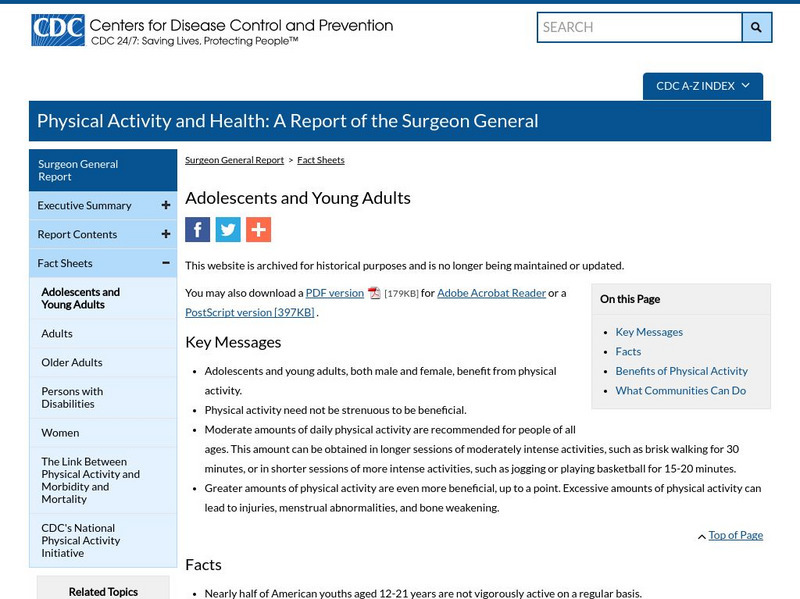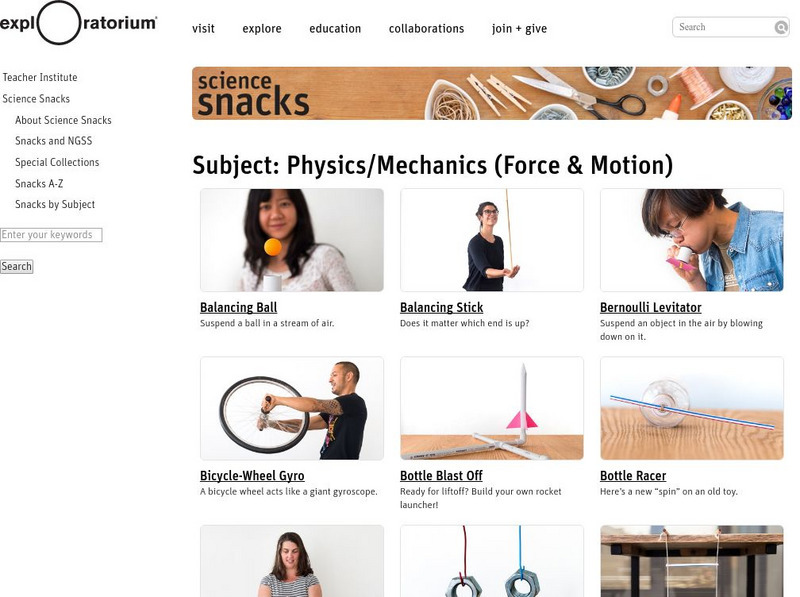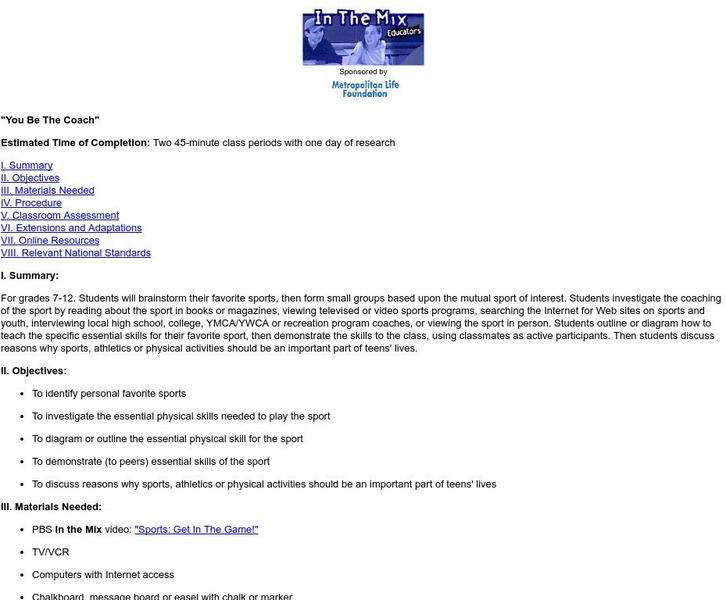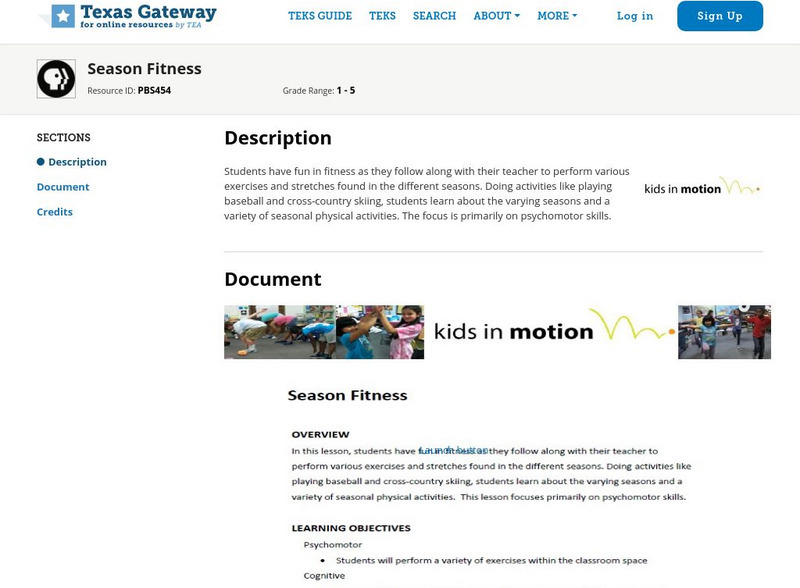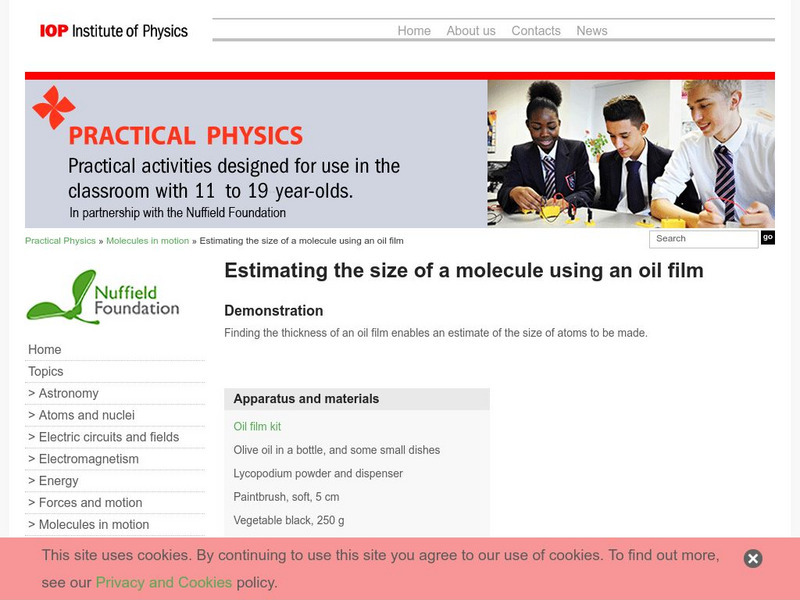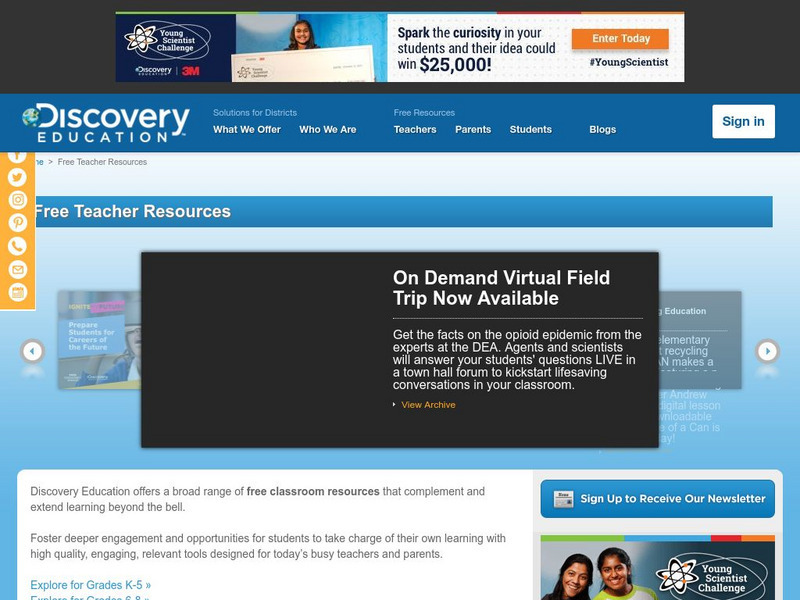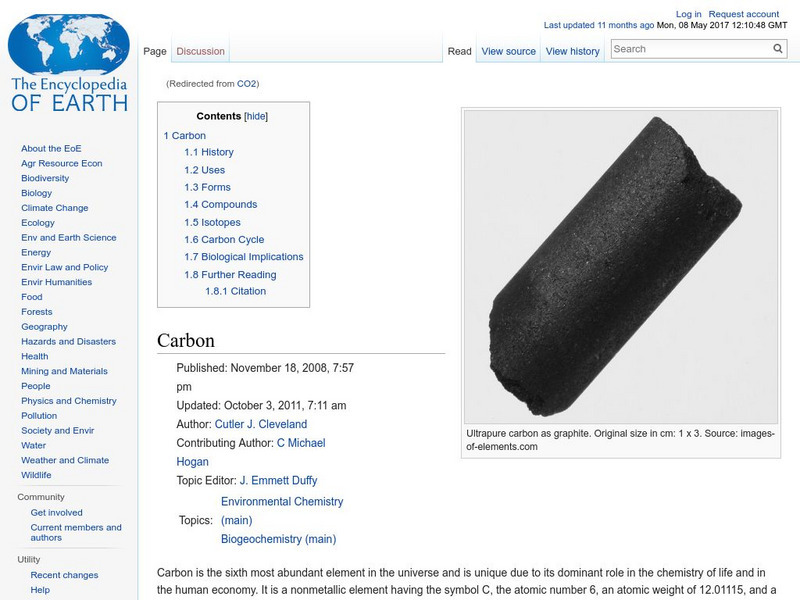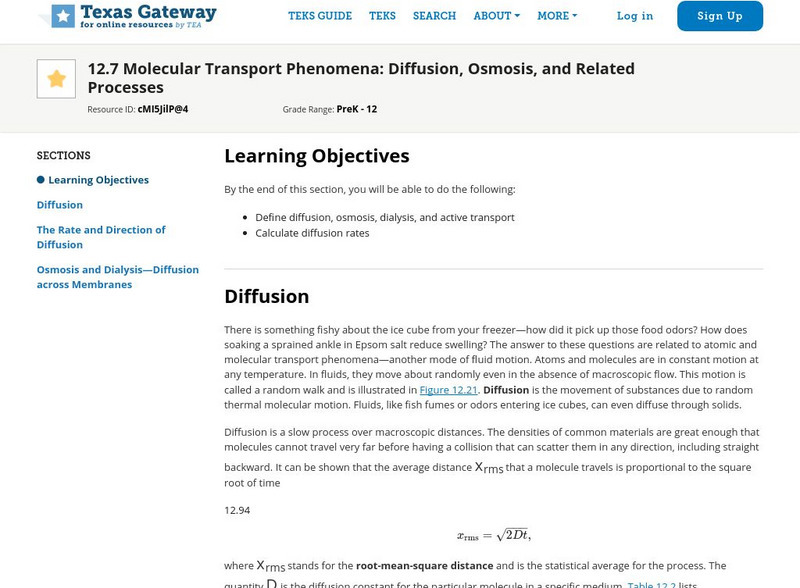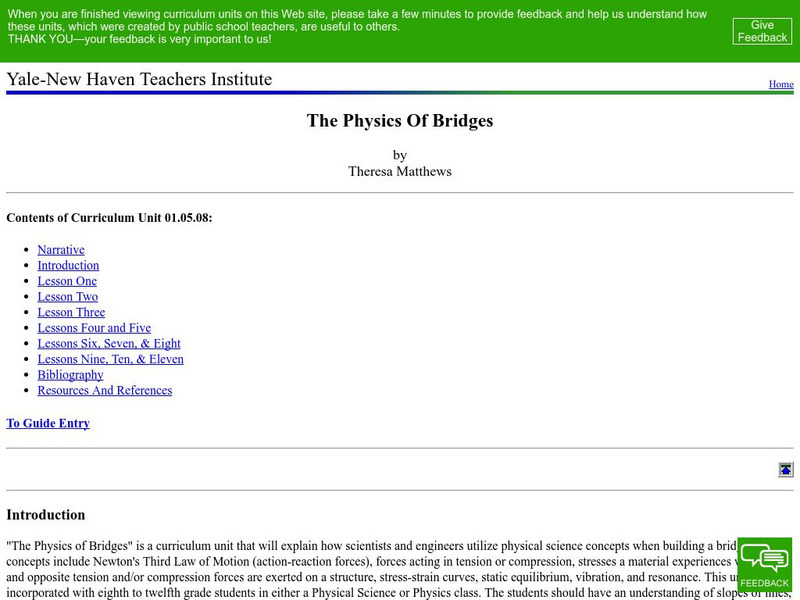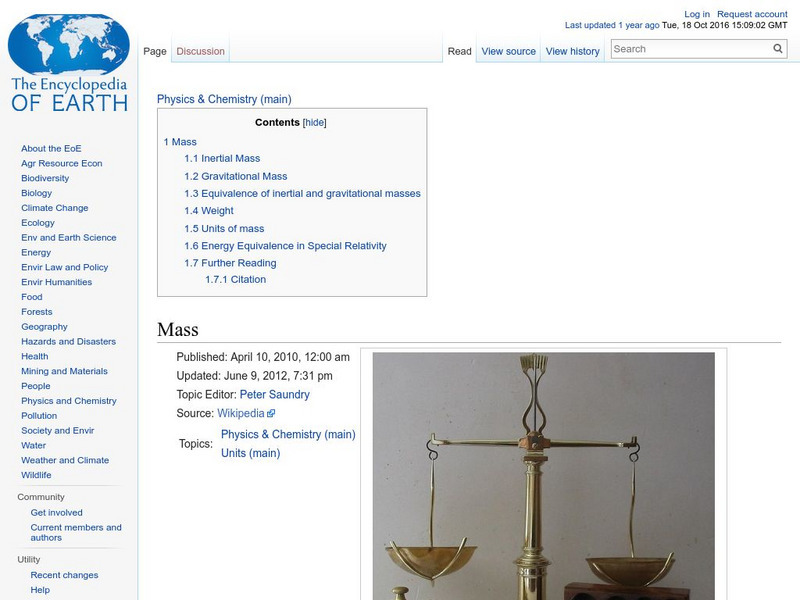American Heart Association
American Heart Association: Getting Healthy: Physical Activity: Get Moving!
Learn about the health benefits of exercise. Content includes helpful tips on how to incorporate activity into your daily life and a link to the association's guidelines for improving heart health through fitness.
Centers for Disease Control and Prevention
Centers for Disease Control: Physical Activity & Health: Adolescents & Young Adults
The finding on whether or not today's teens get enough exercise - they don't. Give suggestions to correct this situation and tells the benefits to daily physical activity.
National Geographic
National Geographic: More Physical Geography and Borders
Lesson on the physical features that create borders and boundaries. Small group and whole class activities, background information, worksheets and assessment.
Other
Institute for Atomic and Molecular Physics
The FOM Institute for Atomic and Molecular Physics (AMOLF) is one of the five national research institutes of the Foundation for Fundamental Research on Matter (FOM). The research at AMOLF is focused on selected areas of atomic,...
Centers for Disease Control and Prevention
Centers for Disease Control: Physical Activity and Health at a Glance
This website provides notes on exercise, its health benefits, and its role in helping all people feel healthier and stronger. Learn about different types of exercises you can do to improve you health. Also, read facts about adults and...
Sesame Street
Sesame Street: Healthy Habits for Life
This comprehensive resource will give you the tools you need to teach children about eating right and being physically active so that they can establish healthy habits for life. Included are easy-to-use, fun lessons and activities that...
Pennsylvania State University
Applied Physics: Model Analysis of an Electric Guitar
Great site explores the physics behind an electrical guitar. Outlines process for conducting an experiment on sound vibrations and provides animated GIF movies showing the first five modes of vibration.
Exploratorium
Exploratorium: Science Snacks: Physics/mechanics (Force and Motion)
A collection of mechanics activities. Many pertain to Newton's laws of motion. Step-by-step directions provided with illustrations. Great for teacher demos or student projects.
PBS
Pbs Teachers:you Be the Coach
Investigate the essential physical skills needed to play a sport. Explore why sports, athletics or physical activities should be an important part of teens' lives.
PBS
Pbs Teachers: Sports Screeners
Examine how physical activity and sports are depicted in movies and on television. Hypothesize how images of physical activity and sports depictions in entertainment can influence young people's attitudes and behaviors.
Texas Education Agency
Texas Gateway: Season Fitness
Students have fun in fitness as they follow along with their teacher to perform various exercises and stretches found in the different seasons. Doing activities like playing baseball and cross-country skiing, students learn about the...
Other
Institute of Physics: Estimating the Size of a Molecule Using an Oil Film
Help your students understand the scale of nanosize objects with this activity. By placing a drop of oil on top of another, students will estimate the size of an oil molecule. Includes activity instructions, analysis questions and...
Discovery Education
Discovery Education: Physical Science: Gravity Gets You Down
In this lesson, students make predictions about falling objects of different sizes and masses to learn about gravity and air resistance. Includes audio vocabulary list and extension activities.
Encyclopedia of Earth
Encyclopedia of Earth: Physics & Chemistry: Carbon Dioxide
Explains what carbon dioxide is, where it is found, sources of it, and describes human activities that contribute to carbon depletion and increased levels of carbon dioxide in the atmosphere. (Updated: February 22, 2013)
PBS
Pbs Learning Media: Marvin K. Mooney Lesson Plan
In this lesson students get to combine the world of literacy and physical movement! As the teacher reads the book "Marvin K. Mooney Will You Please Go Now" by Dr. Seuss, students listen carefully and safely jump up out of their chairs...
National Geographic
National Geographic: Conflict on the Danube
Lesson in which young scholars use maps and text to explore physical and cultural boundaries and the disputes over control of them. Includes two activities with comprehensive and adaptable materials.
Texas Education Agency
Texas Gateway: Molecular Transport Phenomena: Diffusion, Osmosis, & Related Proc
By the end of this section, you will be able to define diffusion, osmosis, dialysis, and active transport and to calculate diffusion rates.
Other
Kqed: The Lowdown: Life Expectancy: Finding Ratio Relationships
In this interactive map, learn how life expectancy, obesity, hypertension, and physical activity rates have changed dramatically throughout the United States over the last three decades.
Yale University
Yale New Haven Teachers Institute: The Physics of Bridges
Introduce learners to physics concepts that engineers use when building a bridge. This curriculum unit includes concepts such as Newton's Third Law, stress on a material, vibration, and resonance. Unit includes lectures, lab activities,...
Pennsylvania State University
Applied Physics: Vibrational Modes of a Circular Membrane (Drums)
Site tracks the vibrations of a drum and provides an animated movie.
Encyclopedia of Earth
Encyclopedia of Earth: Physics & Chemistry: Mass
Defines inertial and gravitational mass, their scientific history, formulas used in their calculation, the definition of weight, units used for mass, and mass as perceived in the theory of special relativity.
Science and Mathematics Initiative for Learning Enhancement (SMILE)
Smile: Lab Activity: Aviation
This site from the Illinois Institute of Technology provides a student lab activity in which the flight of a paper airplane is investigated and studied. Designed for primary grades, but easily adaptable for junior high students.
National Geographic
National Geographic: Ocean Abiotic Factors
After looking at examples of biotic and abiotic factors in ecosystems, students focus on abiotic factors in marine ecosystems, the physical processes that are involved, and the impact human activities can have on these. Includes handouts...
Other
Bright Hub Education: Improving Spatial Awareness in Toddlers
Parents and teachers can help young children develop spatial ability by using the following spatial toddler activities with their youngsters or students.
Other popular searches
- Benefits of Physical Activity
- Physical Activity Games
- Daily Physical Activity
- Physical Activity Logs
- Physical Activity Pyramid
- Physical Activity Teamwork
- Physical Activity and Health
- Promoting Physical Activity
- Physical Activity Units
- Body Type Physical Activity
- Types Physical Activity
- Cooperate Physical Activity

